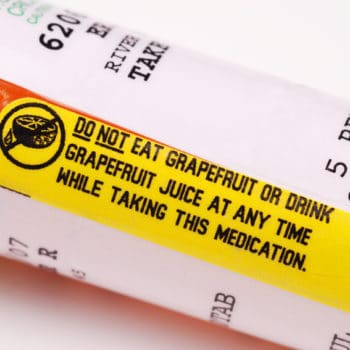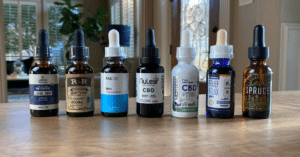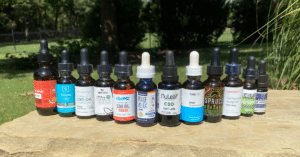Most medical researchers are in general agreement that CBD is safe and non-addictive. We regularly hear from users who tell us that CBD helps them manage conditions like anxiety, chronic pain and insomnia.
But CBD is also known to have the potential to interact with some medications, especially those that are metabolized by the liver. So if you are taking any prescription drugs or over-the-counter medications, we strongly recommend that you consult with your doctor before using CBD products.
The purpose of this article is to discuss some of what is known about CBD interactions with medications. We also provide some links to resources that can help you do your own research. But there is no substitute for professional medical advice that is tailored to your own unique situation.
How Does CBD Interact With Medications?
The main concern stems from the fact that CBD is metabolized by the same liver enzymes as about 60% of clinically prescribed drugs. This family of enzymes is called cytochrome P450, or CYP 450. Research suggests that CBD can act as an inhibitor to the P450 enzyme. This means that CBD can affect the body’s ability to break down some prescription drugs when they are taken together.
If this occurs, more or less of the prescription drug can enter your system than when it is taken on its own. The change in medication levels caused by the interaction could lead to adverse side effects or a reduction in the effectiveness of the medication.
Some common medications that may be altered by CBD use include:
- Antibiotics
- Antidepressants
- Antihistamines
- Anti-inflammatory medications
- Benzodiazepines (benzos)
- Blood thinners
- Blood pressure medications
This is NOT an exhaustive list. So it’s important that you speak with your doctor about using CBD if you are taking any prescription medication. They should be able to help ensure that your dosage levels and schedule are safe if there are any potential interactions.
A very useful resource for doing your own research is the cannabis drug interactions page on Drugs.com. Since CBD is extracted from the cannabis plant, drug interactions with cannabis are a good indicator for drug interactions with CBD.
The Grapefruit Warning
If your medication has a grapefruit warning, that is a good indication that there may be an interaction issue with CBD. This is because grapefruit and grapefruit juice can inhibit the P450 enzyme in the same way as CBD. Again, you should speak with your doctor before taking CBD if your medication carries this warning.

Combining CBD Oil and Prescription Drugs
Generally, using CBD in normal amounts while also taking prescription drugs creates few, if any, adverse effects for most people. It often depends on what drugs are prescribed, dosage levels and other factors like age and genetic makeup.
This is why it’s important that you talk to your doctor for guidance. There are some situations where there’s a need to adjust dosage of the CBD or the medications if taken together.
Your doctor may also recommend that you separate your doses of CBD and any medications by a couple of hours. Doing so can help ensure that each has time to metabolize properly on its own without interacting.
Researchers are currently looking into the interactions of medications with CBD. They tend to be cautious when making statements about whether something is certain until they have enough research to support their claims. Unfortunately, this process can take years.
More studies of CBD are being done now both by government researchers and the pharmaceutical industry. The number of these studies is expected to increase given the growing popularity of CBD.
Potential Positive Interaction
With some prescription drugs, there can be an advantage to combining them with CBD. Substituting the use of a natural substance to reduce the need for a chemical one can lessen the work your liver has to do to shed the chemical toxins.
Taking less of a prescription drug can also reduce the side effects you might experience from taking that medication. There is an increasing awareness in the medical community of the potential usefulness of CBD in combination with other treatments.
One of the most dramatic instances is the effectiveness of CBD with chemotherapy. Researchers have found that CBD has cancer-fighting properties, which prevent tumor formation and the movement of cancer cells to other parts of the body.
CBD Drug Interactions – The Bottom Line
If you’re taking any prescription drug, you should discuss potential interactions with your doctor before using any CBD product. This is especially true if you are taking a medication that is metabolized by the liver or warns about taking it with grapefruit
If you are uncomfortable asking your doctor about potential interactions of CBD, you can ask them if any of your medications may interact with grapefruit. When the answer to that question is yes, you will want to exercise caution in combining them with CBD.
Over time, CBD may help you reduce or eliminate some of your prescription drugs. But you should never reduce or stop taking any prescribed medication without first consulting your doctor.






One Response
How can I possibly ask my dr about any interaction of the meds I take n cbd oil when she never even heard of the oil, she’s useless.
I am currently on cholesterol/20 mg of pravastatin, 50 mg /tramadol for fibromyalgia 8 in a day when needed, klonopin 1mg/ for anxiety n sleeping and celexa 60 mg depression, aspirin 80 mg once a day. I am taking cbd oil low n slow at night but do feel dizzy when I wake up. I only take at night because don’t want to feel dizzy all day.
If you could help w info I would appreciate because I am lost. My rheumatologist suggested I start the oil.. I do have a mmj card. However the rheumatologist has no idea about interactions either. Doctors need to be more informed because this is the future. Thank you